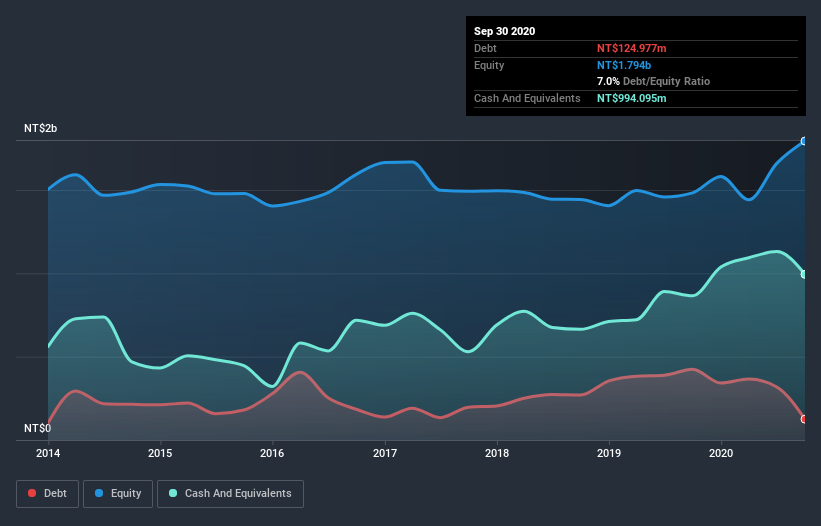Some say volatility, rather than debt, is the best way to think about risk as an investor, but Warren Buffett famously said that 'Volatility is far from synonymous with risk.' When we think about how risky a company is, we always like to look at its use of debt, since debt overload can lead to ruin. As with many other companies Browave Corporation (GTSM:3163) makes use of debt. But is this debt a concern to shareholders?
Why Does Debt Bring Risk?
Debt and other liabilities become risky for a business when it cannot easily fulfill those obligations, either with free cash flow or by raising capital at an attractive price. Ultimately, if the company can't fulfill its legal obligations to repay debt, shareholders could walk away with nothing. However, a more common (but still painful) scenario is that it has to raise new equity capital at a low price, thus permanently diluting shareholders. Of course, plenty of companies use debt to fund growth, without any negative consequences. The first step when considering a company's debt levels is to consider its cash and debt together.
Check out our latest analysis for Browave
What Is Browave's Net Debt?
You can click the graphic below for the historical numbers, but it shows that Browave had NT$125.0m of debt in September 2020, down from NT$424.8m, one year before. However, its balance sheet shows it holds NT$994.1m in cash, so it actually has NT$869.1m net cash.

How Healthy Is Browave's Balance Sheet?
The latest balance sheet data shows that Browave had liabilities of NT$986.5m due within a year, and liabilities of NT$105.6m falling due after that. On the other hand, it had cash of NT$994.1m and NT$836.1m worth of receivables due within a year. So it can boast NT$738.1m more liquid assets than total liabilities.
This excess liquidity suggests that Browave is taking a careful approach to debt. Due to its strong net asset position, it is not likely to face issues with its lenders. Succinctly put, Browave boasts net cash, so it's fair to say it does not have a heavy debt load!
Better yet, Browave grew its EBIT by 655% last year, which is an impressive improvement. That boost will make it even easier to pay down debt going forward. The balance sheet is clearly the area to focus on when you are analysing debt. But it is Browave's earnings that will influence how the balance sheet holds up in the future. So when considering debt, it's definitely worth looking at the earnings trend. Click here for an interactive snapshot.
But our final consideration is also important, because a company cannot pay debt with paper profits; it needs cold hard cash. While Browave has net cash on its balance sheet, it's still worth taking a look at its ability to convert earnings before interest and tax (EBIT) to free cash flow, to help us understand how quickly it is building (or eroding) that cash balance. Over the last three years, Browave actually produced more free cash flow than EBIT. That sort of strong cash conversion gets us as excited as the crowd when the beat drops at a Daft Punk concert.
Summing up
While we empathize with investors who find debt concerning, you should keep in mind that Browave has net cash of NT$869.1m, as well as more liquid assets than liabilities. And it impressed us with free cash flow of NT$385m, being 136% of its EBIT. The bottom line is that we do not find Browave's debt levels at all concerning. When analysing debt levels, the balance sheet is the obvious place to start. However, not all investment risk resides within the balance sheet - far from it. To that end, you should be aware of the 2 warning signs we've spotted with Browave .
At the end of the day, it's often better to focus on companies that are free from net debt. You can access our special list of such companies (all with a track record of profit growth). It's free.
If you’re looking to trade Browave, open an account with the lowest-cost* platform trusted by professionals, Interactive Brokers. Their clients from over 200 countries and territories trade stocks, options, futures, forex, bonds and funds worldwide from a single integrated account. Promoted
Valuation is complex, but we're here to simplify it.
Discover if Browave might be undervalued or overvalued with our detailed analysis, featuring fair value estimates, potential risks, dividends, insider trades, and its financial condition.
Access Free AnalysisThis article by Simply Wall St is general in nature. It does not constitute a recommendation to buy or sell any stock, and does not take account of your objectives, or your financial situation. We aim to bring you long-term focused analysis driven by fundamental data. Note that our analysis may not factor in the latest price-sensitive company announcements or qualitative material. Simply Wall St has no position in any stocks mentioned.
*Interactive Brokers Rated Lowest Cost Broker by StockBrokers.com Annual Online Review 2020
Have feedback on this article? Concerned about the content? Get in touch with us directly. Alternatively, email editorial-team@simplywallst.com.
About TPEX:3163
Browave
Engages in the design, manufacture, and sale of optical fiber communication components in Taiwan and internationally.
Flawless balance sheet with acceptable track record.
Similar Companies
Market Insights
Community Narratives



